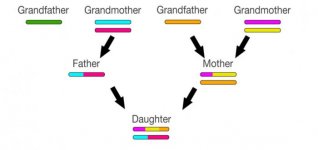I'm no expert on the X, but my understanding is that when a mother passes along an X chromosome to her children both male and female it is a "new" X chromosome, which is the product of recombination between her two X chromosomes. Thus the X a brother and sister receive from their mother won't be identical. This recombination is important because mistakes are corrected.
The father passes along the X passed to him by his mother, with no further recombination, but of course his mother's X was the product of recombination itself, from both her male and female lines.
So, as a female, I am getting the most "matches" on X genetic material from my paternal grandmother, which makes me happy as she was intelligent and tough.
What is not getting passed down in this scenario is the father's, father's X ancestry if I understand it correctly. So, as a female, I don't have any X inheritance from my paternal grandfather's X ancestry. That's also good. I didn't much like him.
As a male, you only get your mother's X ancestry, but from both the paternal and maternal lines. You get none of your father's X ancestry.
I think that's how it works.
This is a fun article on the subject on why daughters and fathers share such a bond:
https://www.psychologytoday.com/blo...loned-brains-the-secret-fathers-and-daughters
"
I pointed out that the evidence is that, thanks to a large number of genes on the X being implicated in intelligence and related cognitive skills, you could say that you inherit your IQ from your mother. This is obviously the case with sons, who receive their one and only X-chromosome from their mothers (with a corresponding Y from their fathers). But it is indirectly true of daughters too, because although they get an X-chromosome from both parents, the X they get from their father is exactly the same one that he got from his mother—his daughter’s paternal grandmother. This makes daughters’ relatedness to their fathers in this respect different to their relatedness to their mothers. The X-chromosome a woman inherits from her mother is a random mix of genes from both of her mother’s Xs, and so does not correspond as a whole with either of them in the way in which her paternal X-chromosome corresponds to her father’s X."
It gets more complicated because genes might be disproportionately expressed in the body, but this is what he concludes:
"This in turn means that some daughters might be cognitively much more like their fathers than their mothers—especially if the paternal X were disproportionately expressed in their brains. They would be X-chromosome clones of their fathers in this respect because each and every X-gene he had would be inherited and expressed by them. In other words, if sex chromosome expression is skewed in favour of the father’s X in the brain, a woman’s mind could end up surprisingly similar to her father’s in many respects—and, by the same reasoning, surprisingly dissimilar to her mother’s!"
This couldn't be more true in my case, but that's one anecdotal case. You'd need to do really well conducted studies to find out if this is generally true.
X chromosome inheritance for a female:
X chromosome inheritance for a male:
Don't take these as gospel; it's just what people have put up on the internet



